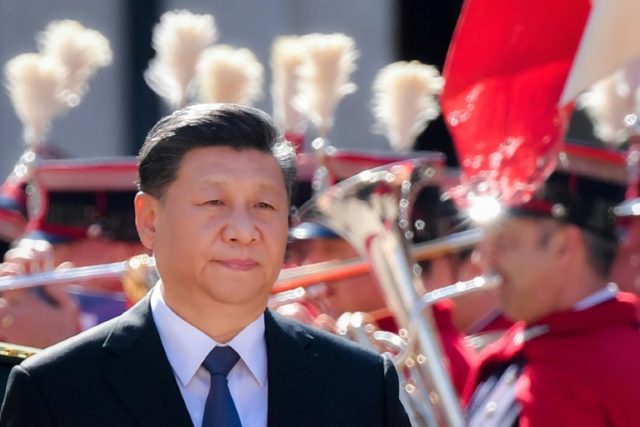China’s state-run Global Times propaganda arm published an opinion piece condemning “the West” for the current instability in Libya on Tuesday, arguing that “the West couldn’t care less” about Tripoli and that Libya is “one of the biggest failures” of the Arab Spring.
Tripoli is currently undergoing an invasion by the Libyan National Army (LNA), an unofficial militia under the control of warlord Khalifa Haftar. Haftar is believed to control most of the country, but not the capital, currently under the rule of the internationally recognized Government of National Accord (GNA). Haftar, who claims to be a secularist attempting to establish himself against the many Islamist elements vying for power in the country, ordered an airstrike on Libya’s only airport on Monday in addition to the ground invasion, which the United States, United Nations, and many in the international community have condemned.
Haftar enjoys the support of Russia, France, and Saudi Arabia, among other global actors.
China does not have an official position in defense of any warring faction in Libya, but it has signed economic agreements with the GNA. Prior to doing so, it vocally opposed international voices calling for the overthrow of dictator Muammar Qaddafi in 2011. Now, Beijing appears to be using the power vacuum left by Qaddafi to condemn Western voices, including the Obama administration, who supported his removal.
“The West-hailed Arab Spring eight years ago has been proven to be one of the least effective revolutions ever in history. Libya, Syria and Yemen continue to suffer,” the Global Times offered on Tuesday in a piece titled “West Should Feel Guilty for Resumed Fighting in Libya.” “Egypt has restored a de facto military regime while US allies in the Gulf were barely affected. Tunisia is the only relatively stable country that underwent a lot.”
While the Middle East remains in turmoil, the Times argues, “Libya has almost been forgotten except for its refugees.”
“Libya is one of the biggest failures since the Arab Spring, and has lost the strategic attention of the West,” it continues. “The West used to have a clear enemy – Gaddafi. Stimulated by the ideological concern, the West interfered in Libya with considerable investments regardless of the consequences.”
Summarizing the current offensive against the GNA in the capital, the Times goes on to contend that “Tripoli is not an ideological target and geopolitical significance has declined. The West couldn’t care less about it.” Instead, the piece argues, the “West” has pivoted towards the overthrow of dictator Bashar al-Assad in Syria.
In a rare move, the state-sponsored article condemned the United States for withdrawing troops from Libya this week, rather than calling for America to leave the region. “When Libya faced another crisis, the US obviously sent a negative signal by withdrawing soldiers,” the piece reads. “The West only cares about promoting democracy but walks away on rebuilding,” the Global Times concluded.
When Gaddafi fell in 2011, China was still under the control of then-President Hu Jintao, who had a much less expansive vision for China’s international involvement than current leader Xi Jinping. In its role as a permanent U.N. Security Council member, China opposed global pressure to support action against Gaddafi, as it had long had an alliance with the dictator. China abstained from voting for a no-fly zone in Libya and took a particularly hard line against France, which had become the most vocal power for intervention against Gaddafi.
The intervention and overthrow thus left China with little opportunity for an alliance with the official government that succeeded Gaddafi. Chinese officials immediately began expressing hope that post-Gaddafi Libya would “continue to protect the interests and rights of Chinese investors” and had some success in pursuing business with the new government.
It took years for the GNA to establish itself in Tripoli enough to extend its hand to China. In February 2018, China sent its top diplomat in the country to pursue talks with senior Libyan leaders on “China’s role in development and improvement of the Libyan economy.” The talks bore fruit in July, when Libya officially joined One Belt, One Road, China’s play for global economic domination. The Belt and Road Initiative, as it is also known, nominally consists of building Chinese-controlled roads, ports, and railways to connect western Europe to Beijing, recreating the ancient Silk Road, but in practice also includes projects in Africa, the South China Sea, and Latin America.
The Belt and Road deal called for the return of Chinese corporations to Libya to pursue economic development, particularly in relation to the OPEC country’s oil supply. Libyan Prime Minister Fayez Serraj of the GNA acknowledged this agreement and hoped to expand his relationship with China in remarks in September, giving China a stake in protecting the GNA.
“Our country is at an extraordinary stage and faces multiple political, economic and security challenges,” Serraj said. “We look forward to cooperating with the friendly People’s Republic of China to meet these challenges.”

COMMENTS
Please let us know if you're having issues with commenting.